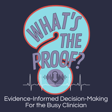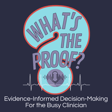
#2 Aspirin for Primary Prevention of Cardiovascular Disease
Is it true that "an aspirin a day keeps the doctor away?" Aspirin has long been used to prevent cardiovascular disease for those at risk, but new evidence has driven a major shift in professional guideline recommendations. Drs. Bobby Scott and Sandy Robertson review three landmark studies which have informed these practice-changing guidelines, and explore how over the past 20 years, we went from a state of confidence in its benefits to confidence in its lack of benefit for most people without established cardiovascular disease.
Additionally, in "Residents Ask the Darnedest Things," Dr. Scott attempts to answer a question about the best second-generation antihistamine to treat allergic rhinitis.
Key statistic for counseling patients: "For every 1200 persons taking aspirin for primary prevention for 5 years, there will be 4 fewer MACEs, 3 fewer ischemic strokes, 3 more intracranial hemorrhages, and 8 more major bleeding events." - Moriarty/Ebell ("A comparison of..." article linked below)
Episode outline:
- History of aspirin use for primary prevention 01:39
- Current ACC/AHA and USPSTF guidelines 06:05
- Evidence behind the changed recommendations 11:01
- How did we get here? Was this a medical reversal? 22:31
- Residents Ask The Darnedest Things 30:17
Links from this episode:
- 2019 ACC/AHA Guidelines: https://pubmed.ncbi.nlm.nih.gov/30879355/
- 2021 USPSTF Guidelines (Draft): https://www.uspreventiveservicestaskforce.org/uspstf/draft-recommendation/aspirin-use-to-prevent-cardiovascular-disease-preventive-medication
- ARRIVE: https://pubmed.ncbi.nlm.nih.gov/30158069/
- ASCEND: https://pubmed.ncbi.nlm.nih.gov/30146931/
- ASPREE: https://pubmed.ncbi.nlm.nih.gov/30221596/
- Post-hoc analysis of ASPREE and cancer mortality: https://pubmed.ncbi.nlm.nih.gov/32778876/
- A comparison of contemporary versus older studies of aspirin for primary prevention: https://pubmed.ncbi.nlm.nih.gov/31751455/
- The effectiveness of modern antihistamines for treatment of allergic rhinitis - an IPD meta-analysis of 140,853 patients: https://pubmed.ncbi.nlm.nih.gov/23524648/
If you liked the episode, please leave a positive review and subscribe! Tell your colleagues and friends!
Comments/Questions/Suggestions? Email us at whatstheproofpodcast@gmail.com or find us on Twitter @theproofpodcast!
Credits:
- Hosts: Bobby Scott, MD, FAAFP; Sandy Robertson, PharmD; Dawn Caviness, MD, BSN
- Production & Cover Art: Bobby Scott, MD, FAAFP
- Music: Twisterium, MondayHopes, Muzaproduction, and SergeQuadrado from Pixabay

